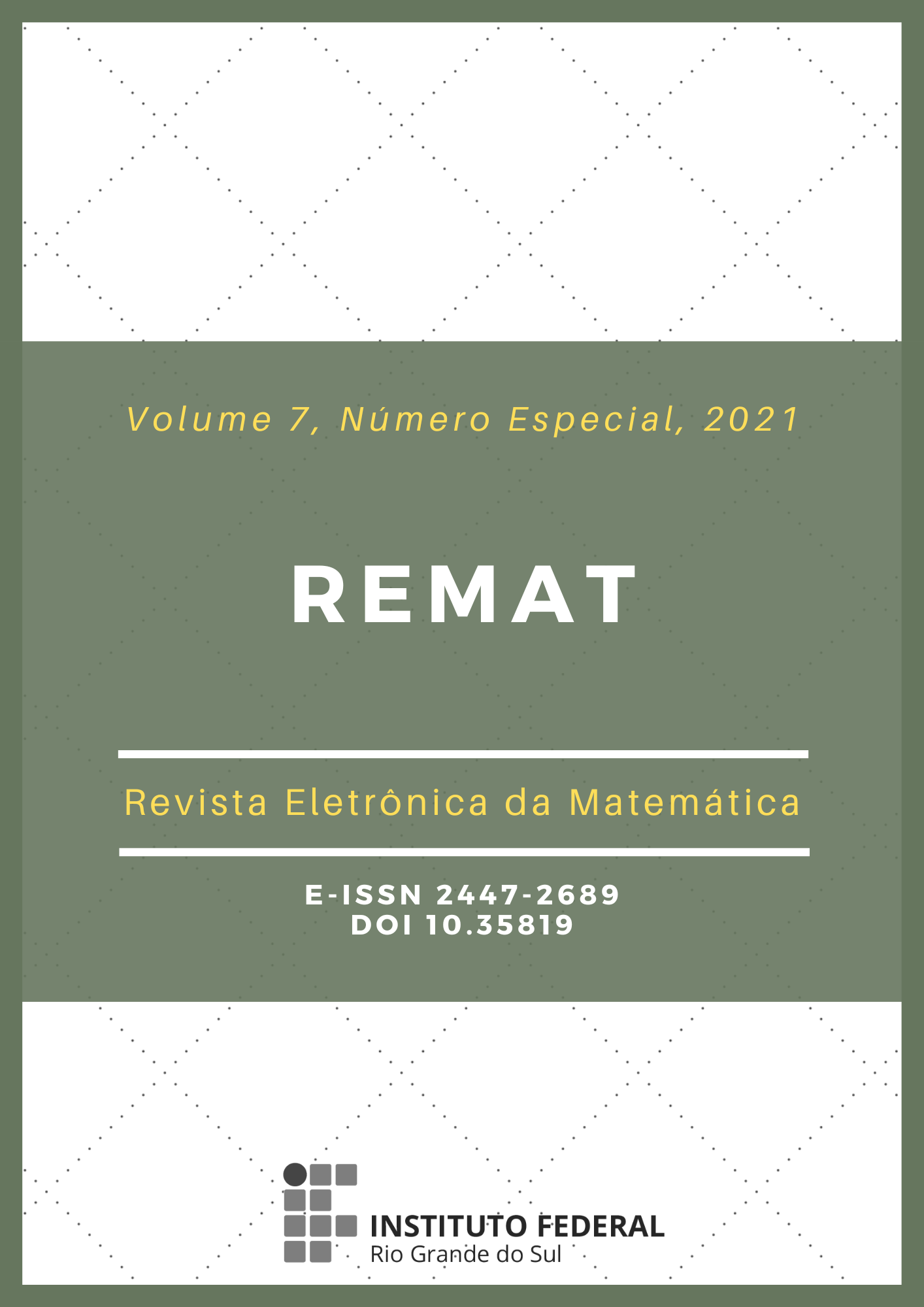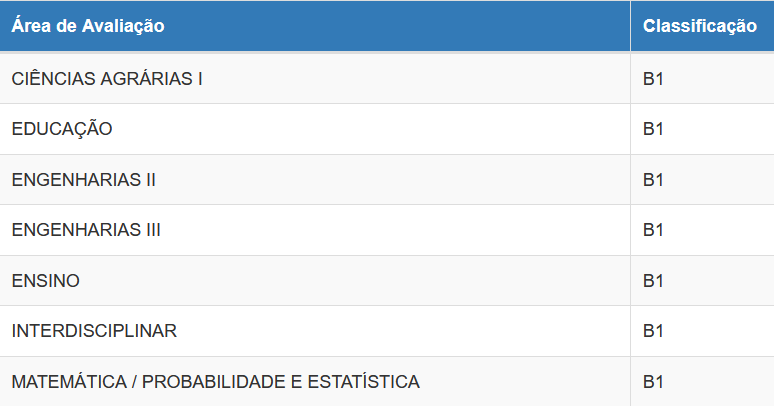Teaching-learning of Mathematics via Problem Solving: analysis of the problem solving process of undergraduates in initial formation
DOI:
https://doi.org/10.35819/remat2021v7iespecialid5490Keywords:
problem as a starting point, problems solution, difficultiesAbstract
This work aims to analyze the Problem Solving process of undergraduates in initial formation in the formative context of Teaching-Learning of Mathematics via Problem Solving (EAMvRP). Therefore, we dealt with the EAMvRP approach with 18 graduates from a public university in northern Paraná. The classes were recorded and transcribed and, together with the resolutions made by the undergraduates, they were qualitatively analyzed in a descriptive way. The analysis proceeded through a synthesis of the steps of Problem Solving in Proença (2018). The main results reveal that in the representation stage, properly understanding the semantic, linguistic and schematic knowledge favors the identification of information superfluous to the problem. We noticed that in the planning stage, the use of mathematical symbology collaborated to justify the resolution of the groups. In the execution stage, all groups had a visual-pictorial type of mind when they used drawings to develop their resolutions. Finally, in the last step – monitoring –, we identified that only one of the four resolutions that were analyzed developed this step satisfactorily, presenting a final answer to the problem. Thus, we can conclude that when developing the EAMvRP taking into account the steps of resolution of Proença (2018), the process becomes much richer, more interesting, collaborates in the identification of possible difficulties for students and, consequently, favors the development of a fruitful teaching of Mathematics.
Downloads
References
ARAUJO, Natália Keli Santos. Análise das dificuldades na resolução de problemas matemáticos por alunos do 5º ano do ensino fundamental. Orientadora: Veleida Anahi da Silva. 2015. 139 f. Dissertação (Mestrado em Ensino de Ciências e Matemática) – Universidade Federal de Sergipe, São Cristóvão, 2015. Disponível em: https://ri.ufs.br/jspui/handle/riufs/5174. Acesso em: 27 dez. 2021.
BRASIL. Ministério da Educação. Secretaria de Ensino Fundamental. Parâmetros Curriculares Nacionais: 3º e 4º Ciclos. Brasília: SEF/MEC, 1998.
BRITO, M. R. F. Alguns aspectos teóricos e conceituais da solução de problemas matemáticos. In: BRITO, M. R. F. (org.). Solução de Problemas e a Matemática escolar. Campinas: Alínea, 2006.
CHIZZOTTI, A. Pesquisa em Ciências humanas e sociais. São Paulo: Cortez, 1991.
GIL, A. C. Métodos e técnicas de pesquisa social. 6. ed. São Paulo: Atlas, 2008.
KRUTETSKII, V. A. The psychology of mathematical abilities in schoolchidren. Tradução de João Teller, do russo para o inglês. Chicago: University of Chicago Press, 1976.
LUZ, J. A. da; PROENÇA, M. C. Resolução de Problemas de Geometria Espacial: Análise das dificuldades de alunos do ensino médio em questões do ENEM 2018. In: ENCONTRO PARANAENSE DE EDUCAÇÃO MATEMÁTICA, 15., 2019, Londrina. Anais [...]. Londrina: SBEMPR, 2019. p. 1-12. Disponível em: http://www.sbemparana.com.br/eventos/index.php/EPREM/XV_EPREM/paper/viewFile/1016/904. Acesso em: 27 dez. 2021.
MATSUDA, F. F. S. Um ensino de equação do 1º grau com uma incógnita via resolução de problemas. Orientador: Marcelo Carlos de Proença. 2017. 131 f. Dissertação (Mestrado em Ensino de Ciências e Educação Matemática) – Universidade Estadual de Maringá, 2017. Disponível em: http://repositorio.uem.br:8080/jspui/handle/1/4499. Acesso em: 27 dez. 2021.
MAYER, R. E. Implications of cognitive psychology for instruction in mathematical problem solving. In: SILVER, E. A. (ed.). Teaching and learning mathematical problem solving: multiple research perspectives. Hillsdale: LEA, 1985.
MENDES, L. O. R.; AFONSO, E. J. M.; PROENÇA, M. C. Análise da compreensão de licenciandos em Matemática sobre o ensino via Resolução de Problemas. Educação Matemática Debate, Montes Claros, v. 4, n. 10, e202011, p. 1-23, 9 abr. 2020. DOI: https://doi.org/10.24116/emd.e202011.
MENDES, L. O. R.; PEREIRA, A. L.; PROENÇA, M. C. O que dizem as pesquisas sobre a Resolução de Problemas na formação inicial de professores de Matemática: um olhar sobre as fragilidades metodológicas. Educação Matemática Pesquisa, São Paulo, v. 22, n. 2, 27 ago. 2020. DOI: https://doi.org/10.23925/1983-3156.2020v22i2p721-750.
MENDES, L. O. R.; PROENÇA, M. C. O ensino de matemática via Resolução de Problemas na formação inicial de professores. Revista de Educação Matemática, Guarulhos, v. 17, p. e020014, 1 maio 2020. Disponível em: https://www.revistasbemsp.com.br/index.php/REMat-SP/article/view/255. Acesso em: 27 dez. 2021.
ONUCHIC, L. R.; ALLEVATO, N. S. G.; NOGUTI, F. C. H.; JUSTULIN, A. M. (org). Resolução de Problemas: Teoria e Prática. Jundiaí, SP: Paco Editorial, 2014.
ONUCHIC, Lourdes de la Rosa; ALLEVATO, Norma Suely Gomes. Pesquisa em Resolução de Problemas: caminhos, avanços e novas perspectivas. Bolema: Mathematics Education Bulletin, Rio Claro, v. 25, n. 41, p. 73-98, 2011. Disponível em: http://hdl.handle.net/11449/72994. Acesso em: 27 dez. 2021.
POLYA, G. A arte de resolver problemas. v. 2. Rio de Janeiro: Interciência, 1994. p. 12.
PROENÇA, M. C. Generalização de padrões algébricos no ensino via Resolução de Problemas: compreensão de licenciandos em Matemática. Educação Matemática Pesquisa, São Paulo, v. 21, n. 3, p. 419-437, 20 dez. 2019a. DOI: https://doi.org/10.23925/1983-3156.2019vol21i3p419-437.
PROENÇA, M. C. Resolução de problemas: encaminhamentos para o ensino e a aprendizagem de Matemática em sala de aula. Maringá: Eduem, 2018.
PROENÇA, M. C. Uma Proposta de Ensino-Aprendizagem das Operações Aritméticas com Frações via Resolução de Problemas. Educação Matemática em Revista, Brasília, v. 24, n. 63, p. 5-17, 21 out. 2019b. Disponível em: http://sbem.iuri0094.hospedagemdesites.ws/revista/index.php/emr/article/view/1632. Acesso em: 27 dez. 2021.
SOUSA, A. C.; PROENÇA, M. C. Uma proposta de ensino de equação de 1.º grau com uma incógnita via Resolução de Problemas. Revista Prática Docente, Confresa, v. 4, n. 2, p. 431-451, 2019. DOI: https://doi.org/10.23926/RPD.2526-2149.2019.v4.n2.p431-451.id511.
STEFANI, Amanda; PROENÇA, Marcelo Carlos de. Análise das dificuldades de alunos dos anos finais do ensino fundamental na Resolução de Problemas de perímetro e área. Revista Paranaense de Educação Matemática, Mourão, v. 8, n. 16, p. 97-118, 2019. Disponível em: http://revista.unespar.edu.br/index.php/rpem/article/view/606. Acesso em: 27 dez. 2021.
STERNBERG, Robert J. Psicologia cognitiva. [S. l.]: Piccin, 2000.
WALLAS, G. The art of thought. New York: Harcourt-Brace, 1926.
Downloads
Published
How to Cite
Issue
Section
License
Copyright (c) 2021 REMAT: Revista Eletrônica da Matemática

This work is licensed under a Creative Commons Attribution 4.0 International License.
REMAT retains the copyright of published articles, having the right to first publication of the work, mention of first publication in the journal in other published media and distribution of parts or of the work as a whole in order to promote the magazine.
This is an open access journal, which means that all content is available free of charge, at no cost to the user or his institution. Users are permitted to read, download, copy, distribute, print, search or link the full texts of the articles, or use them for any other legal purpose, without requesting prior permission from the magazine or the author. This statement is in accordance with the BOAI definition of open access.

































